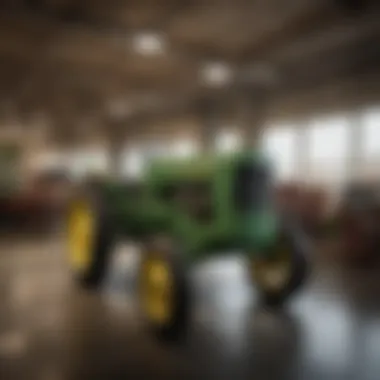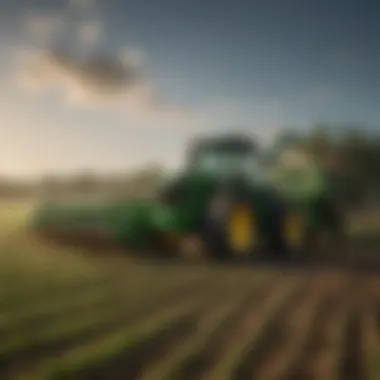John Deere in Winchester: Historical Impact & Innovation


Overview of the Topic
John Deere is a prominent name in the agricultural equipment industry. Its presence in Winchester, Virginia, significantly contributes to the local agricultural landscape. This overview provides insight into the role of John Deere, its importance to the community, and the current trends affecting modern agriculture.
Definition and Importance
John Deere manufactures a wide range of agricultural machinery and solutions. The brand is known for its commitment to quality and innovation. In Winchester, John Deere plays a vital role in supporting local farmers with the tools they need for efficient and productive farming. The machinery designed by John Deere helps in increasing crop yields and optimizing labor efficiency, thus enhancing overall agricultural performance in the region.
Current Trends
Several trends are shaping the agricultural sector today:
- Precision Agriculture: Farmers are utilizing advanced technology for better data collection and analysis.
- Sustainability: There is a growing emphasis on sustainable farming practices to preserve natural resources.
- Automation: Increased automation in farming processes is allowing for more efficient operations.
These trends reflect a shift towards modernized farming, which aligns with John Deere's focus on innovative agricultural solutions.
Key Techniques and Practices
To maximize the benefits of John Deere products, understanding key techniques and practices is essential.
Step-by-Step Guide
- Identify Needs: Assess the specific requirements of your farming operations.
- Research Products: Explore the range of John Deere equipment available.
- Consult Experts: Seek advice from agricultural experts or John Deere representatives.
- Purchase Equipment: Invest in the machinery that fits your farming needs best.
- Training: Ensure that you and your team are trained in using the equipment effectively.
Tools and Equipment Needed
Essential tools for successful farming often include:
- Tractors
- Seeders
- Harvesters
- Sprayers
- Precision farming tools
These tools not only help in enhancing productivity but also ensure that farming practices remain efficient and sustainable.
Challenges and Solutions
Despite its numerous benefits, there are challenges that John's Deere and local farmers face in Winchester.
Common Obstacles
Some common challenges include:
- High operational costs of advanced machinery.
- Adaptation to new technology and practices.
- Environmental concerns and regulations impacting farming processes.
Innovative Solutions
John Deere addresses these challenges with innovative solutions such as:
- Providing financing options for farmers to manage equipment costs.
- Offering training programs to help farmers adapt to technology.
- Developing equipment that is specifically designed to meet environmentally-friendly standards.
"The integration of innovative agricultural solutions with local farming practices is vital for sustainable growth."
In summary, John Deere's influence in Winchester is profound. Its commitment to farmers through quality equipment, community engagement, and sustainable practices strengthens the agricultural sector in Virginia. This overview provides a foundation for understanding the brand's impact and relevance in modern farming.
Preface to John Deere
The significance of John Deere in the agricultural sector transcends geographical boundaries. In Winchester, Virginia, it embodies a legacy of innovation, quality, and community engagement that resonates deeply with local farmers and agricultural enthusiasts. This section lays the foundation for understanding the company's impact and relevance in the area.
Historical Background
John Deere, founded in 1837 by a blacksmith of the same name, began as a small operation producing plows to meet the needs of farmers in Illinois. The company quickly gained recognition for its robust and effective farming equipment. By the late 19th century, John Deere had expanded its product line, making significant contributions to agricultural machinery.
The move into mechanized farming marked a turning point in farming practices. The introduction of the steel plow allowed farmers to cultivate more land and improve crop yields. Over the decades, John Deere adapted to changing agricultural needs. It evolved from primarily producing plows to offering a wide range of machinery, including tractors, combines, and advanced planting equipment. The historical relevance of John Deere is not merely in the products it offers but also in its role as a catalyst for agricultural development and sustainability.


The Company's Evolution
John Deere's evolution reflects both technological advancements and shifts in agricultural practices. In the early 1900s, the company embraced the use of gasoline engines, setting the stage for the modern tractor era. This innovation was crucial as it allowed farmers to work larger fields with greater efficiency. The post-World War II era saw further advancements, including the introduction of hydraulic systems and larger equipment designed for productivity.
As agriculture moved into the 21st century, John Deere recognized the importance of integrating technology into its machinery. The widespread implementation of GPS technology and precision farming techniques illustrates the company's commitment to enhancing productivity and sustainability. John Deere has also ventured into data analytics and smart farming solutions to support farmers in making informed decisions.
Overall, the company’s drive to adapt and innovate has reinforced its position as a leader in the agricultural sector. The journey from manual tools to intelligent farming solutions encapsulates the significance of John Deere not just as a manufacturer, but as a partner in agricultural advancement. This history and ongoing evolution sets the context for understanding its current presence and future potentials in Winchester, Virginia.
John Deere’s Presence in Winchester, Virginia
John Deere has established a notable presence in Winchester, Virginia, playing a significant role in the local agricultural landscape. The importance of this presence can be understood through several key aspects, including the brand's influence on local farming practices, economic contributions, and the ongoing support for the agricultural community. This section unpacks these elements to provide a clearer picture of how John Deere integrates itself within Winchester.
Local Dealership Overview
The John Deere dealership in Winchester serves as a vital hub for farmers and agricultural enthusiasts in the region. This dealership offers a comprehensive range of products, from tractors to harvesting equipment. It is not just a retail space; it acts as a resource center where customers can receive expert advice tailored to their specific farming needs.
Customers can benefit from hands-on demonstrations and access to knowledgeable staff who understand the nuances of different farming operations. This localized expertise allows farmers to make informed decisions about which equipment will best enhance their productivity.
Service and Support Facilities
Service and support are crucial in maintaining agricultural equipment. John Deere's Winchester facility provides essential repair services and parts support. This ensures that farmers can have their machinery up and running with minimal downtime, which is vital during planting and harvesting seasons.
The support offered includes:
- Regular maintenance checks to prolong equipment life.
- Emergency repair services to address unexpected breakdowns.
- Training for operators to optimize equipment use.
These facilities and services contribute to increased operational efficiency for local farmers. By reducing maintenance delays and enhancing equipment longevity, John Deere strengthens its commitment to supporting the agricultural sector in Winchester. In turn, this fosters a stronger, more resilient local farming community.
Product Offerings in Winchester
In considering the impact of John Deere in Winchester, Virginia, the product offerings are of paramount importance. They not only reflect the company's commitment to high-quality agricultural equipment but also showcase how John Deere tailors its machinery to meet the unique demands of farmers in this region. The range of products available plays a crucial role in enhancing farming efficiency and productivity. Local farmers benefit directly from these products, as they are designed to handle local conditions and can lead to improved crop yields.
Tractors and Harvesters
Tractors are the backbone of agricultural operations. John Deere's line of tractors in Winchester includes models suited for various scales of farming. From small, compact tractors ideal for small farms, to larger models capable of handling extensive acreage, there is an option for almost every need.
Harvesters also feature prominently in the local product lineup. These machines are essential during the crucial harvest season. For example, the John Deere S Series combines bring advanced technology and efficiency to the harvesting process, ensuring crops are gathered quickly and with minimal loss.
Planting and Tillage Equipment
The planting and tillage equipment offered by John Deere helps farmers prepare their fields efficiently. Products like the John Deere 1775NT planter are well-regarded for their precision and reliability. They support farmers in achieving optimal planting depth and spacing, which contributes to better crop establishment.
Tillage equipment, such as the John Deere 2630 Series, is critical for soil management. Proper tillage helps in soil aeration and weed control, crucial factors that enhance overall soil health and productivity.
Precision Agriculture Tools
Precision agriculture is becoming increasingly vital in modern farming practices. John Deere provides an array of tools designed to integrate technology into farming. For instance, the John Deere Operations Center allows farmers to monitor and manage their fields effectively. This platform enables the analysis of data collected from equipment.
Additionally, tools like the John Deere GPS guidance systems help improve accuracy during planting and harvesting. Adopting these types of technology in Winchester ensures that local farmers can optimize their operations and make informed decisions about resource allocation.
"Investing in precision agriculture not only boosts efficiency but also supports sustainable farming practices."
Economic Impact of John Deere in the Region
The presence of John Deere significantly influences the economic landscape in Winchester, Virginia. This section outlines the specific ways in which the company contributes to local development and prosperity. Key points include job creation and the overall boost to the local economy. Understanding these elements is essential for grasping how John Deere integrates with the community and agricultural framework of Winchester.
Job Creation
John Deere's operation in Winchester is a considerable source of employment for the region. The company offers various positions, from assembly line workers to skilled technicians and management roles. The focus on recruitment within the local community demonstrates a commitment to supporting the economy. As John Deere grows, it often expands its workforce, adding more jobs to the area, including seasonal and permanent positions.
- Employees gain access to training programs that enhance skills and job performance.
- Many workers find long-term career opportunities through the company.


This commitment to local employment helps to stabilize the job market, allowing families to thrive and contribute to community welfare.
Boosting Local Economy
John Deere's financial impact goes beyond just creating jobs. The company's operations stimulate various sectors in the local economy. When John Deere sources materials and services from local suppliers, it promotes a vibrant business ecosystem. This interplay generates significant revenue that benefits surrounding merchants and service providers.
- Local businesses, including restaurants and shops, experience increased patronage from employees and visitors.
- Tax revenues grow, providing funds for public services such as education and infrastructure.
John Deere also actively engages in community initiatives, further emphasizing its role as a key economic player in Winchester. This engagement not only enhances the company’s reputation but also solidifies its integration into the local socio-economic fabric.
"John Deere's commitment to the local economy creates a ripple effect that touches many aspects of community life."
These contributions are critical for a resilient local economy, illustrating John Deere's importance beyond the agricultural sphere. The ongoing partnership between John Deere and the Winchester community leads to a more prosperous future for all stakeholders.
Community Engagement and Initiatives
Community engagement is a vital aspect of John Deere's operations in Winchester, Virginia. This initiative focuses on creating a positive impact within the local community and emphasizes the company's commitment to social responsibility. The relationship between John Deere and the Winchester community is multifaceted, involving educational initiatives and sustainability efforts that resonate with both the company and local stakeholders.
Educational Programs
John Deere actively participates in educational programs that aim to inspire the next generation of agricultural professionals. The company's collaborations with local schools and agricultural colleges provide students with opportunities to learn about modern farming techniques and technology. These programs often feature hands-on workshops, internships, and scholarships that not only enhance learning but also instill an understanding of the agricultural industry’s importance.
In particular, John Deere supports STEM (Science, Technology, Engineering, and Mathematics) programs, recognizing their fundamental role in fostering innovation in agriculture. By engaging with students in such ways, John Deere helps to build a skilled workforce that can tackle the evolving challenges of the agricultural sector. Furthermore, these initiatives benefit local farmers by ensuring a flow of fresh talent and new ideas into the industry.
Sustainability Efforts
Sustainability is a cornerstone of John Deere's philosophy in Winchester. The company's commitment to environmentally friendly practices extends far beyond their products; they adopt sustainable strategies within their community initiatives as well. John Deere engages in projects that promote conservation, responsible resource use, and renewable energy sources. These efforts not only contribute to environmental health but also support the agricultural community in adapting to climate change.
"The commitment to sustainability in farming is essential for future generations. John Deere's initiatives in Winchester are a step towards that future."
Community programs include tree planting events, water conservation workshops, and awareness campaigns focusing on soil health. John Deere collaborates with local organizations to raise awareness about sustainable practices that farmers can implement on their farms. These efforts not only help preserve the local environment but also ensure that farming remains viable in Winchester for years to come.
Innovations and Technology in Agriculture
Innovations and technology play a crucial role in transforming agriculture. They are key to improving productivity, sustainability, and efficiency in farming practices. In Winchester, Virginia, John Deere continuously embraces technological advancements to enhance its offerings and meet the evolving needs of farmers. This section delves into the specifics of smart farming and the integration of artificial intelligence (AI) and machine learning.
Adoption of Smart Farming
Smart farming represents a significant shift in agricultural methods, using technology to collect and analyze data. This approach allows farmers to make informed decisions, optimizing their operations. John Deere has invested in various smart farming tools. These include precision planting, variable rate seeding, and automated machinery.
Farmers can monitor soil conditions, crop health, and weather patterns in real time. This information is invaluable, enabling them to adjust their practices promptly. The benefits of adopting smart farming are impressive:
- Increased efficiency: Precision agriculture minimizes waste and maximizes resource use.
- Cost savings: Reducing inputs like seeds and fertilizers lowers operating expenses.
- Higher yields: By addressing specific crop needs, farmers can increase their overall yields.
John Deere's commitment to smart farming allows Winchester's farmers to enhance their productivity. This shift not only improves farm income but also supports sustainable practices essential for the long-term health of the agriculture sector.
Integration of AI and Machine Learning
Artificial intelligence and machine learning are reshaping various sectors, and agriculture is no exception. John Deere employs these technologies to analyze vast amounts of data collected from its machinery. This process enhances decision-making processes on farms.
By using AI, Deere's machines can identify patterns and predict outcomes based on historical data. For instance, machine learning algorithms can determine the optimal time for planting, irrigating, and harvesting crops. This not only increases efficiency but also reduces risks associated with farming.
Key advantages of integrating AI in agricultural practices include:
- Predictive analytics: Farmers can anticipate challenges such as pest infestations or droughts.
- Automated solutions: Machines can operate autonomously, reducing the need for manual labor.
- Data-driven decisions: Farmers can make informed adjustments based on real-time insights.
"The future of farming relies on technology that provides actionable insights for better decision-making."
In summary, John Deere's focus on innovations and technology ensures that farmers in Winchester are equipped with essential tools. These advancements not only address immediate challenges but also pave the way for a sustainable agricultural future.
Challenges Faced by John Deere in Winchester


The operations of John Deere in Winchester, Virginia do not occur in a vacuum. The company faces numerous challenges that impact its performance and contributions to the local agricultural economy. This part of the article focuses on the specific elements of these challenges, providing insight into how they affect John Deere. A clear understanding can inform potential solutions and highlight the importance of adaptive strategies in the agricultural sector.
Market Competition
Market competition is a significant hurdle for John Deere in Winchester. The agricultural equipment industry has various players introducing innovations at a fast pace. Competitors like Case IH and Kubota offer similar products, putting pressure on John Deere to maintain its market share.
Farmers in the region often evaluate several brands before making purchases. They consider factors such as cost, reliability, parts availability, and service options. John Deere must continuously improve to remain attractive to both established and new customers.
Additionally, the emergence of smaller, nimble startups that focus on specialized farming solutions can dilute the customer base. This diversification in the market forces John Deere to assess its strategies critically. They need to balance innovation and cost while keeping the brand’s traditional values intact.
"In a competitive market, understanding the customer’s needs and preferences can be the key differentiator."
Supply Chain Issues
Supply chain issues represent another formidable challenge for John Deere. Recent disruptions in global supply chains have affected manufacturers across various sectors, and agriculture is no exception. Delays in the delivery of vital components can hinder production timelines, impacting inventory levels at local dealerships in Winchester.
The swift changes in demand also affect John Deere. Farmers have increasingly turned to equipment that ensures efficiency and sustainability, especially after weather-related disruptions. This shift often results in periods of unexpected demand that outpace supply. Consequently, John Deere must adapt its operations to align more closely with these changing dynamics.
Moreover, increasing transportation costs impact profitability. Fluctuating fuel prices and logistical constraints can lead to budget overruns, hindering their ability to provide competitive pricing for customers.
To mitigate these supply chain challenges, John Deere may need to invest in better inventory management and strengthen relationships with suppliers. Flexibility in supply chain operations can provide a buffer against future disruptions, which is essential in today’s unpredictable environment.
Future Outlook for John Deere in Winchester
The future outlook of John Deere in Winchester holds significant importance in understanding the brand's ongoing contributions to the agricultural landscape. This section explores the potential directions, innovative pathways, and sustainable ambitions that John Deere aims to implement in the region. By analyzing these elements, stakeholders can grasp how John Deere not only adapts to market demands but also shapes the future of farming practices in Winchester.
Expansion Plans
John Deere has established itself as a frontrunner in agricultural machinery. The company's expansion plans in Winchester denote its commitment to meeting the evolving needs of local farmers. There are several facets to consider when discussing these plans:
- Increased Product Range: John Deere is working to introduce a broader selection of machinery tailored to the unique requirements of Winchester's agricultural profiles. This includes advanced harvesters and specialty tractors.
- Facility Enhancement: Upgrades to local facilities are underway. This not only improves service delivery but also enhances customer experiences, making it easier for farmers to access support.
- Technology Integration: Expanding technological capabilities is a prime focus. John Deere aims to leverage smart farming solutions to provide data-driven insights, improving productivity and efficiency.
- Local Partnerships: The emphasis on strategic alliances with local suppliers and farmers is crucial. Such collaborations can drive innovation while ensuring that the products remain relevant to the residents of Winchester.
These expansion plans underscore John Deere's dedication to fostering a more integrated and efficient agricultural ecosystem within the region.
Long-term Sustainability Goals
As agricultural practices face increasing pressure from climate change and resource scarcity, John Deere's long-term sustainability goals are vital. The company's initiatives reflect a deep understanding of these challenges, aiming for a lasting impact:
- Sustainable Equipment Development: Creating machinery with reduced environmental impact is a priority. John Deere is focused on producing equipment that consumes less fuel and utilizes renewable energy sources.
- Resource Conservation Programs: Initiatives that promote efficient water and soil management are key. These programs encourage local farmers to implement practices that sustain their resources while maintaining productivity.
- Community Engagement in Sustainability: Regarding local partnerships, John Deere is fostering education about sustainable farming practices. This helps ensure that the community adopts eco-friendly methods over the long term.
"Sustainability is not just an add-on but a core principle driving John Deere's future decisions in Winchester."
- Research and Development Investment: The company is continually investing in research that aims to push the boundaries of sustainable agriculture, ensuring that their machinery evolves with environmental needs.
These long-term goals suggest that John Deere is not only focused on profitability but also on the viability of agriculture in Winchester for generations to come. The company’s efforts in sustainability will likely resonate well within the farming community, emphasizing the interconnected nature of modern agriculture and environmental stewardship.
The End
The importance of the conclusion in this article cannot be understated. It serves as a pivotal summary that encapsulates the key insights presented throughout the piece. By reiterating the main themes such as John Deere's historical significance, product offerings, economic impact, community engagement, and technological innovations, the conclusion provides clarity and reinforces the relevance of the discussed topics.
In addition to summarizing key points, the conclusion also highlights the benefits that John Deere brings to Winchester, Virginia. The company's commitment to sustainable practices and its substantial contributions to the local economy stand out as integral elements that affect not just farmers, but the community at large.
Furthermore, successful adaptation to challenges faced by John Deere, including competition and supply chain issues, offers hopeful insights for development in the future. It’s essential to consider the dynamic nature of agriculture and markets, and how John Deere can evolve alongside these changes.
Ultimately, this conclusion emphasizes the necessity of continued support and innovation from John Deere. Staying ahead in technology and enhancing local capabilities will help ensure that both the company and the agricultural community can thrive.
Summary of Key Points
- Historical Significance: John Deere has a rich history that contributes to its brand identity.
- Product Offerings: Diverse and innovative machinery supports local farmers.
- Economic Impact: Contributes to job creation and boosts the local economy.
- Community Engagement: Involvement in local educational and sustainability programs enhances its connection to the community.
- Challenges: Navigating market competition and supply chain issues is vital for future success.
- Future Growth: Plans for expansion and sustainability will shape the company's direction.
The Importance of Continued Innovation
Innovation is essential in agriculture, and John Deere's commitment to continual development plays a crucial role in its strategy. Farming challenges evolve, requiring modern solutions to enhance productivity and sustainability. John Deere’s efforts to integrate smart farming technologies, like precision agriculture tools, exemplify this focus.
The integration of artificial intelligence and machine learning also demonstrates a forward-thinking approach. These technologies help farmers make informed decisions based on data, optimizing yields while minimizing resource usage.
Ultimately, continued innovation does not just benefit the company but enriches the farming community in Winchester. By leading the way in agricultural advancements, John Deere can help ensure both economic resilience and environmental sustainability.



